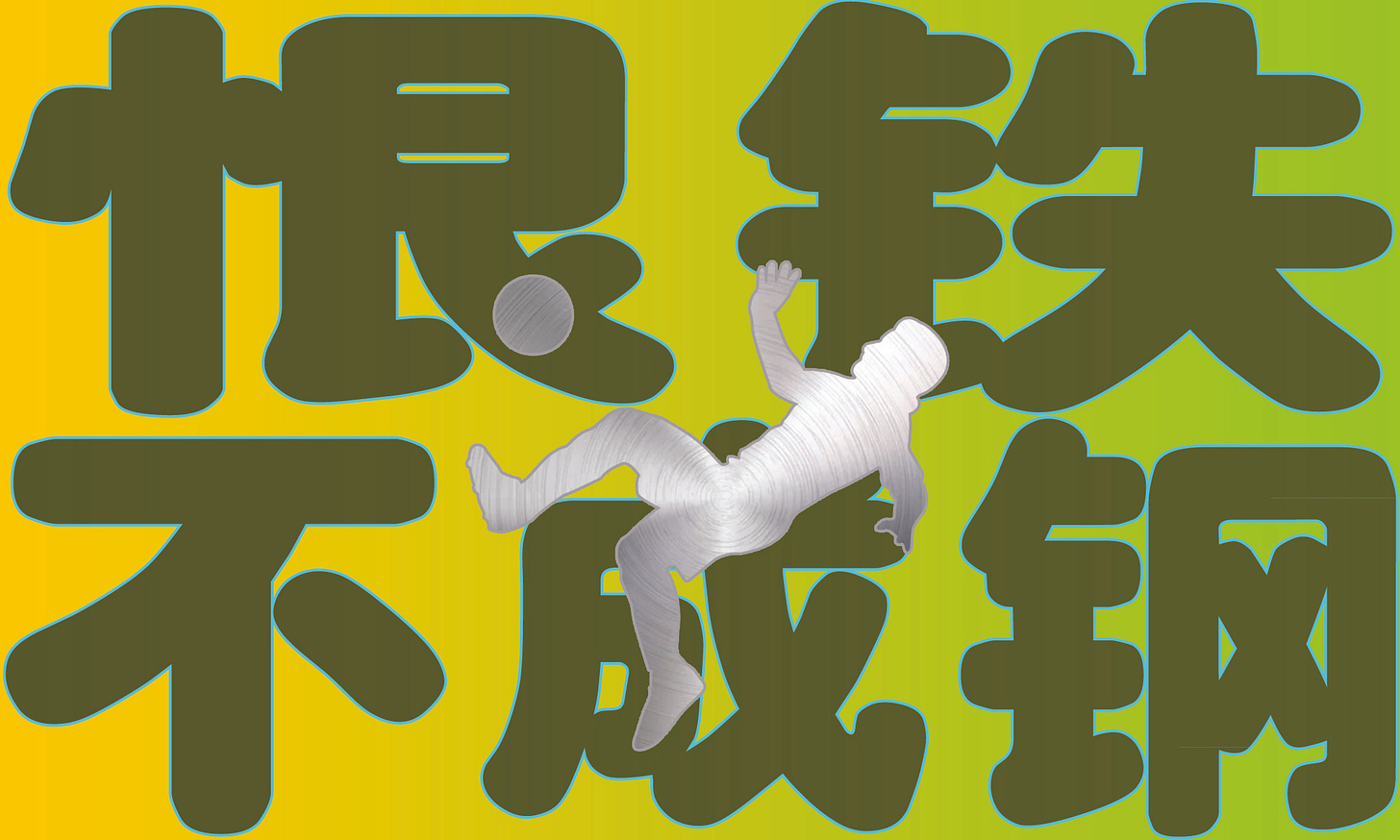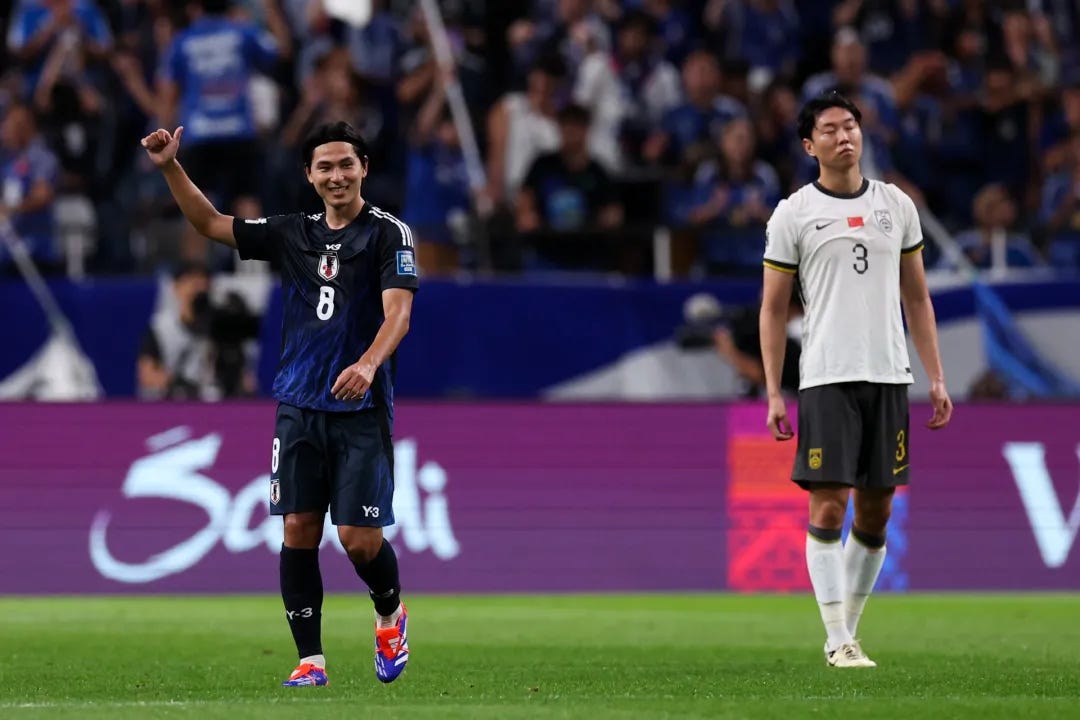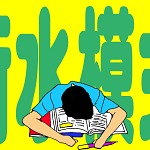Welcome to RealTime Mandarin—a multimedia resource to immerse you in the latest Chinese language trends, inspire you to practice and improve your Mandarin every week, and empower you to communicate with confidence.
This exclusive content is part of RTM+, our premium membership. Upgrade now to unlock full access and take your Mandarin to the next level!
During the first round of the 2026 World Cup Asian qualifiers last week, the Chinese men’s national football team suffered a crushing 0-7 defeat to Japan.
Playing away in Saitama, north of Tokyo, team China’s loss marks its biggest ever defeat to Japan, setting a new record for the most goals conceded, and the largest margin of defeat in World Cup qualifiers by any team.
The humiliation against Asia’s top-ranked team was China’s worst defeat in World Cup qualifying and fell just one goal short of their record 0-8 loss to Brazil in 2012.
Understandably, fans, the media, and social media users were upset and heavily criticized the team.
A comment from Fàn Zhìyì 范志毅, former Chinese international footballer and team captain, who played in the UK for Crystal Palace, Dundee, and Cardiff City, summed up the feelings of many Chinese fans:
The opposition was allowed to score too easily.
If I wasn’t so far away, watching it would really make me want to jump into the Huangpu River.
这比赛对面球进得太容易了,要不是这里离得远,看得我真的想跳进黄浦江了。
This remark quickly became a meme and was widely shared online.
But the disappointment of Chinese fans had already begun before the match even kicked off.
Tuning into CCTV Sports just before kick-off, fans were met with this message from the state broadcaster:
"Due to copyright issues, we were unable to broadcast this match."
“由于版权问题,我们无法进行本场比赛的直播。”
It turns out that the broadcast rights, owned by the Asian Football Group (AFG), had been purchased by video streaming platform iQIYI 爱奇艺, so CCTV could not air the match.
Adding to fans' frustration, those trying to watch on iQIYI were met with this message:
To watch this match, non-members need to pay the 9-yuan subscription fee or purchase the "Football Love Annual Pass" at 318 yuan.
想观看本场比赛,非会员用户需要支付9元钱开通会员观看,或是318元购买“爱足球年卡”解锁本场比赛。
So China's defeat to Japan also marked another disappointing first: the first time in Chinese football history that a game was not broadcast on national TV, and the first time fans had to pay to watch.
Online criticism of iQIYI followed, along with mockery of the Chinese football team:
"With just 9 yuan, you can witness 7 goals.
The national team offered us a great deal! "
“花9块钱看7个进球,国足性价比太高了!”
After the match, China’s head coach Ivan Kolev (known as 伊万 in Chinese) acknowledged the strength of the Japanese team and emphasized the need for better preparation.
Chinese player, Zhāng Yùníng 张玉宁, said it how it is, remarking:
"The 0-7 scoreline reflects the true disparity between Chinese and Japanese football."
“0比7的比分,就是中国足球与日本足球的真实差距。”
The defeat underscores the persistent issues in Chinese football.
Inadequate youth training, poor infrastructure, limited opportunities for domestic players, and deep-rooted systemic problems continue to plague the sport. Chinese football, according to commentary in the media, has long seemed incompatible with the demands of professional football.
Corruption and gambling scandals have repeatedly tarnished the game, while the obsession with "money football" has led to chaos.
Each "arms race" leaves domestic players with less room to grow, and fewer are breaking into the top five leagues.
多次陷入“黑、赌”泥潭不说,“金元足球”的一把虚火,更烧得中国足坛一地鸡毛,一轮轮“军备竞赛”下来,本土球员没了发展空间
Recent years have seen major scandals, including the arrest of former head coach Lǐ Tiě 李铁 on corruption charges, as well as numerous match-fixing cases across football including very recently. This culture of corruption, combined with a win-at-all-costs mentality, has discouraged young players from pursuing football professionally.
Ongoing governance issues, poor investment strategies, and a focus on short-term gains over long-term development have left China’s football system struggling to meet international standards.
Chinese football fans, who as we have seen in this newsletter are obsessed with the sport, are also losing hope:
A fan shed tears, expressing that the greatest fear is low morale.
If you can’t outplay them, you can at least outmuscle them. [2]
一位球迷潸然泪下,表示最怕没有斗志,你踢不过球,可以踢他们人啊!
So, is there any hope for Chinese football and its football fans?
That's what we're exploring this week!
🎧 Podcast Preview: Dive deeper with our Member Podcast! This week, we unravel the subtle and often confusing differences between various ways to say “lose” in Chinese: 输 (shū), 败 (bài), 不敌 (bù dí), 失利 (shī lì), 惨败 (cǎn bài), 溃败 (kuì bài), and 惜败 (xī bài). Curious about which one to use in different contexts? Tune in at 8 minutes and 23 seconds to get the full breakdown and enrich your Mandarin skills!
Favourite Five
1. 斗志 dòu zhì
fighting spirit, morale
一位球迷潸然泪下,表示最怕没有斗志,你踢不过球,可以踢他们人啊 - A fan shed tears, expressing that the greatest fear is low morale. If you can’t outplay them, you can at least outmuscle them. [2]
2. 很蓝的啦 hěn lán de la
really blue, hopeless
赢不下来吧,很蓝的啦,很蓝的啦 - We can’t win, it’s really hopeless, it’s really hopeless. [2]
Note: An internet meme and slang phrase which started life in an interview with a football fan who had a strong southern Chinese accent. He was trying to say "it's very hard" (很难) but it came out as "very blue" (很蓝) which sounds the same.
3. 一地鸡毛 yí dì jī máo
a complete mess
“金元足球”的一把虚火,更烧得中国足坛一地鸡毛 - The vain pursuit of "money football" has left Chinese football in complete shambles. [3]
4. 五味杂陈 wǔ wèi zá chén
mixed feelings
叹息、痛骂,压抑、无语,心塞、迷茫,球迷心头五味杂陈 - Sighs, curses, repression, silence, heartache, confusion—the fans are filled with mixed feelings. [3]
5. 恨铁不成钢 hèn tiě bù chéng gāng
wishing iron could become steel; disappointed that someone falls short
这次直接崩盘了,恨铁不成钢的网友纷纷玩起了段子 - This time they were routed, and frustrated netizens started making jokes. [2]
More: We discuss this in tomorrow's Sinica Phrase of the Week.
Consuming the Conversation
Useful words
6. 喷 pēn
to criticise harshly, to rant
连钟文泽这种「老好人」,都忍不住发微博怒喷爱奇艺 - Even Zhong Wenze, who is known for being a nice guy, couldn't help but post a rant on Weibo criticising iQIYI. [4]
Related:
吐槽 tǔ cáo - to roast, to complain (which we last learned when Chinese gaming stocks lost $80 billion in one day!)
7. 国足 guó zú
Chinese national football team
国足从一场惨败开始世预赛18强赛 - The Chinese national football team started the World Cup qualifiers with a crushing defeat. [1]
Related:
国脚 guó jiǎo - “country foot”, national team player
8. 惨败 cǎn bài
crushing defeat, disastrous loss
国足从一场0比7的惨败拉开了18强赛序幕 - The Chinese national team opened the final 18-stage qualifiers with a disastrous 0-7 defeat. [1]
Related:
惜败 xī bài - narrow defeat, close loss
溃败 kuì bài - defeat
失利 shī lì - defeat, loss
9. 崩盘 bēng pán
to collapse, to fall apart
谁成想,这次直接崩盘了 - Who would have thought that this time it would be a spectacular debacle. [2]
10. 纷扰 fēn rǎo
turmoil, chaos
在这些纷扰中,可能唯一没有意外的是比赛本身 - Among all this turmoil, the only thing that might not be surprising is the game itself. [1]
11. 破门 pò mén
to score a goal
由无人盯防的队长远藤航轻松头球破门 - The unmarked captain Endo Wataru easily scored with a header. [1]
Related:
锋线 fēng xiàn - forward
中场 zhōng chǎng - midfield
后卫 hòu wèi - defender
守门员 shǒu mén yuán - goalkeeper
Three-character phrases
12. 潜台词 qián tái cí
hidden meaning, subtext
潜台词是起不到锻炼日本队的作用 - The subtext is that the match was not challenging enough to help Japan improve. [2]
13. 软塌塌 ruǎn tā tā
weak














